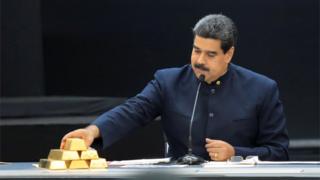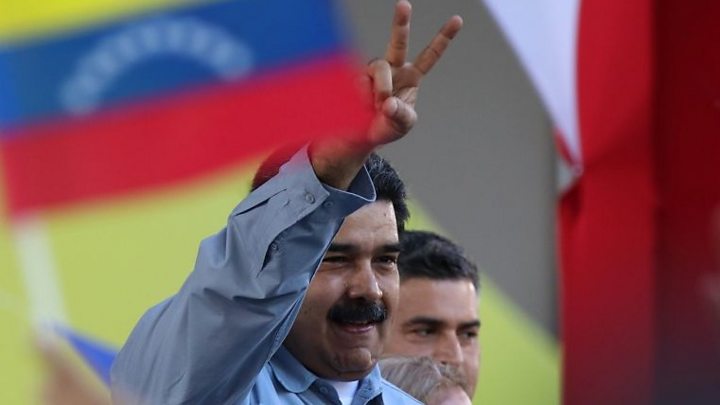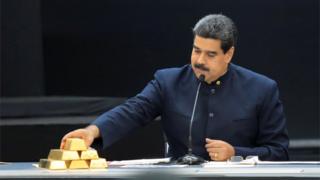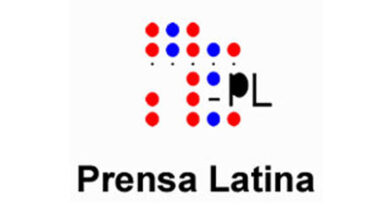Venezuela gold: UK High Court rules against Nicolás Maduro
 Image copyright Reuters
Image copyright Reuters The UK High Court has ruled against Venezuela’s government in a legal battle over access to $1bn (£820m) of gold stored in the Bank of England.
It said the UK had «unequivocally recognised opposition leader Juan Guaidó as president», rather than President Nicolás Maduro.
The ruling comes after the government launched legal action against the bank to try to force it to release the gold.
It is a severe blow to Mr Maduro’s cash-strapped administration.
Lawyers for the Maduro-controlled Venezuelan Central Bank, which brought the case, said they would appeal against the judgement.
The gold is being retained by the Bank of England (BoE) following British and US sanctions on Mr Maduro’s government.
Why was the High Court in London involved?
The BoE said it was caught in the middle of two rival claims for the gold, one from the government of Mr Maduro and one from Mr Maduro’s rival, Juan Guaidó, who declared himself acting president of Venezuela last year.
Mr Maduro’s government said it wanted the gold to fund its fight against the coronavirus pandemic.
But Mr Guaidó asked the Bank of England not to hand the gold over to the Maduro government, arguing that it would be used for corrupt purposes.
The Bank of England therefore asked the High Court to rule on whom the UK government recognises as Venezuelan president, Mr Maduro or Juan Guaidó.
Why is there a doubt about who is president?
Nicolás Maduro was re-elected to a second six-year term in May 2018 in highly controversial elections, which most opposition parties boycotted.
His re-election was not recognised by Venezuela’s opposition-controlled National Assembly, which labelled Mr Maduro a «usurper» and argued that the presidency was vacant.
Citing articles in the constitution which in such cases call for the leader of the National Assembly to step in, Juan Guaidó declared himself acting president.
More than 50 countries recognised Mr Guaidó as the legitimate president, among them the UK. But President Maduro, who retained the support of China and Russia among others, argued that he was the constitutional president and would remain so.
President Maduro has remained in the presidential palace and has control over the police and the military as well as other key institutions such as the electoral body and the supreme court.
What did the court say?
Judge Nigel Teare said: «Her Majesty’s Government does recognise Mr Guaidó in the capacity of the constitutional interim president of Venezuela and, it must follow, does not recognise Mr Maduro as the constitutional interim president of Venezuela.»
He added that there was «no room for recognition of Mr Guaidó as de jure president and of Mr Maduro as de facto president».
A lawyer for Venezuela’s Central Bank – one of the institutions firmly in the hands of the Maduro government – had argued that while the UK government did not approve of the Maduro government, it still recognised it de facto.
He pointed to the fact that the UK has an ambassador in Caracas and that the Maduro-appointed Venezuelan ambassador to London remains in her post in London as proof of the UK’s recognition of the Maduro government.
Another lawyer for Venezuela’s Central Bank said Thursday’s judgement entirely ignored «the reality of the situation on the ground» saying that Mr Maduro’s government was «in complete control of Venezuela and its administrative institutions».
Why is Venezuela’s gold in the UK?
The Bank of England is the second largest keeper of gold in the world, with approximately 400,000 gold bars – only the New York Federal Reserve has more.
It has one of the largest gold vaults in the world and prides itself on never having had any gold stolen in its more than 320-year history.
Central banks of a number of nations use it to store their national gold reserves and Venezuela is one of them.
Why does the Maduro government want its gold now?
Despite the country’s oil riches, Venezuela’s economy has been in freefall for years due to a combination of government mismanagement and corruption, further exacerbated by international sanctions.
As Venezuela produces very little apart from oil, it needs to import goods from abroad, for which it needs access to foreign currency.
But with oil production a fraction of what it once was, Venezuela’s foreign currency reserves have been dwindling.
The Maduro government turned to selling off some of the gold reserves kept at the central bank in Venezuela to its allies in Turkey, Russia and the United Arab Emirates.

Media playback is unsupported on your device
But the US, which does not recognise the administration, last year warned «bankers, brokers, traders and facilitators» not to deal in «gold, oil, or other Venezuelan commodities stolen from the Venezuelan people by the Maduro mafia».
Venezuela has reportedly continued to sell gold to its ally Iran, which is also under US sanctions, but even so its international reserves reached a 30-year low at the beginning of this year, Venezuelan Central Bank figures revealed.
It badly needs hard currency and sees the gold stored in the vaults of the Bank of England as the solution.
It says it wants the funds to be transferred to the United Nations Development Programme (UNDP) to administer the purchase of supplies like medical equipment to fight Covid-19.


